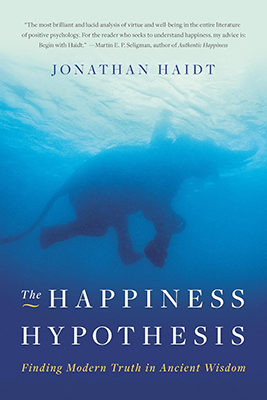The Happiness Hypothesis
“The Happiness Hypothesis” by Jonathan Haidt explores the human quest for happiness through the lens of ancient wisdom and modern psychology. Here’s a summary:
- The Divided Self: Haidt begins by discussing the metaphor of the rider and the elephant, where the rider represents conscious reasoning and the elephant represents automatic processes. He argues that much of our behavior is driven by the elephant, with the rider often struggling to control it.
- Changing Your Mind: Haidt discusses the nature of change and how our minds are often resistant to it. He introduces the idea of the “elephant and rider” metaphor again, emphasizing that to change, both the rider and the elephant need to be engaged.
- Reciprocity with a Vengeance: This section explores the concept of reciprocity and how it shapes human relationships. Haidt discusses the importance of trust and cooperation in building successful societies.
- The Faults of Others: Haidt examines the human tendency to focus on the faults of others while often ignoring our own shortcomings. He suggests that understanding and empathy are essential for harmonious relationships.
- The Pursuit of Happiness: Haidt delves into what makes people happy, drawing on both ancient wisdom and modern research. He emphasizes the importance of relationships, meaningful work, and a sense of purpose in leading fulfilling lives.
- Love and Attachments: This section explores the nature of love and attachment, drawing on evolutionary psychology and anthropology to understand the roots of human bonding.
- Happiness Comes from Between: Haidt argues that happiness is not solely an individual pursuit but is also influenced by our connections to others and our communities. He emphasizes the importance of social support and belonging.
- The Felicity of Virtue: Haidt discusses the role of virtue in leading a happy and meaningful life. He explores various moral systems and argues that virtues such as kindness, honesty, and gratitude are essential for personal well-being.
- Divinity With or Without God: Haidt examines the role of religion and spirituality in promoting happiness and meaning. He suggests that while religious beliefs can provide a sense of purpose and community for many people, they are not essential for leading a fulfilling life.
- The Sanctity of the Body: This section explores the psychology of disgust and its role in shaping moral judgments. Haidt argues that our sense of disgust is deeply ingrained and can influence our attitudes towards various social issues.
- Conclusion: A New Synthesis: Haidt concludes by synthesizing the key ideas presented in the book and offering practical advice for cultivating happiness and well-being in everyday life. He emphasizes the importance of balance, perspective, and self-awareness in navigating the complexities of the human experience.
Overall, “The Happiness Hypothesis” offers a compelling exploration of what it means to live a happy and meaningful life, drawing on insights from psychology, philosophy, and ancient wisdom traditions.

